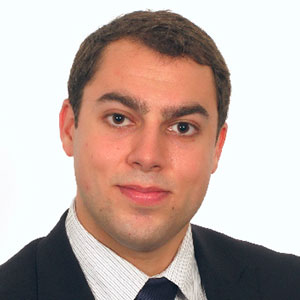Stays by international scientists are not only indicating their attractiveness for the individual research institution or university but also for the entire science and business location. Patrick Fahim, Ph.D. candidate at Delft University of Technology, gained an overview of current work on the Physical Internet, the topic of his doctorate, during a research trip to Fraunhofer IML and the TU Dortmund in recent weeks – read his personal report here.
Today, the way physical objects are moved, stored, produced, supplied and used, is economically, environmentally and socially inefficient and unsustainable. The proposed solution is a hyperconnected global logistics system enabling asset sharing and flow consolidation through encapsulation, modularisation, interfaces and protocols – the Physical Internet (PI). Since 2015, Delft University of Technology addresses a specific aspect of this prominent research topic in a research project funded by the Netherlands Organisation for Scientific Research NWO: including harbours in the Physical Internet. The question is how maritime ports can effectively react to the expected development of the global maritime freight system in the PI. My doctoral thesis will provide one module for answering this question. The objective is to provide maritime ports with recommendations to effectively react to the expected development of the global maritime freight system in the PI.
Fraunhofer IML and TU Dortmund University make a significant contribution to the growing international portfolio of research projects on the Physical Internet. The two research institutions in Dortmund are held in high esteem in the Netherlands. Researchers from Dortmund and Delft regularly exchange views on the development of the Physical Internet, not least through the European Technology Platform (ETP) ALICE. The attractive research environment in Dortmund and at the researchers‘ high motivation were the decisive factors for me to come to Dortmund for a first research trip as part of my doctoral thesis. In autumn this year, I will continue the research for my doctorate with a visiting fellowship at Georgia Institute of Technology in Atlanta, which is also part of the Fraunhofer IML network.
Ultra-modern test halls are an attraction
In particular, the new "Leistungszentrum für Logistik und IT", Centre of Excellence for Logistics and IT in Dortmund addresses the topic Physical Internet and develops roadmaps for further research. But also the "Innovationlab Hybrid Services in Logistics", in which Fraunhofer IML and TU Dortmund University participate as partner, is working on modules for a Physical Internet. The equipment of the test halls is impressive, the experiments and applications provide a deeper understanding of the future supply chain management. Especially helpful for working on my PhD topic is the experience of the Fraunhofer IML staff from their consulting projects with industry. The cooperation of scientific institutions and companies creates a special dynamic. Practical relevance is also high at TU Dortmund University. The orientation towards application helps to look at a rather strategically oriented doctoral topic from a completely different perspective.
ABOUT THE AUTHOR
Patrick Fahim is a Ph.D. candidate at Delft University of Technology, Delft, the Netherlands. His Ph.D. research aims at providing maritime ports with recommendations to effectively cope with the expected future development of global maritime freight networks and flows in a Physical Internet. The research is subdivided into three major topics: Scenario Analysis, Freight Modelling and Policy Recommendations.
MORE ABOUT THE TOPIC
The European Technology Platform ALICE is set up to develop a comprehensive strategy for research, innovation and market deployment of logistics and supply chain management innovation in Europe. The platform will support and assist the implementation of the EU Program for research: Horizon 2020. ALICE is based on the recognition of the need for a comprehensive view on logistics and supply chain planning and control, in which shippers and logistics service providers closely cooperate to reach efficient logistics and supply chain operations. Future research ought to focus on new concepts in which increased cooperation and coordination will eventually result in the Physical Internet where complete horizontal and vertical supply chain cooperation takes place.
You can find an overview on presentations to the topic here. Prof. Rod Franklin (KLU & ALICE Vice-Chair) e.g. provides an overview on the key role of Intralogistics in the Physical Internet pointing out the need for standards (modular units, communication protocols, data sharing, etc.) so that current proprietary transport and logistics networks can be interconnected making actual proprietary networks work in an open ecosystem facilitated by interconnectivity. An explaining video from ALICE about the Physical Internet you can see here.
 Fraunhofer Institute for Material Flow and Logistics IML
Fraunhofer Institute for Material Flow and Logistics IML